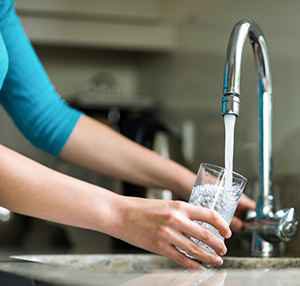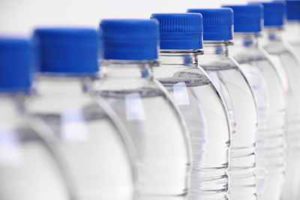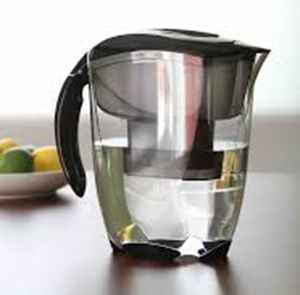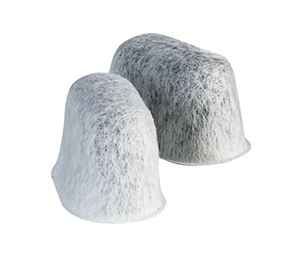
What Type of Water Should You Use in Your Keurig?
If you’re wanting to make a delicious fresh hot cup of coffee, you must have two things.
The first, is of course, coffee. The second component to a delicious fresh cuppa Joe is something that a lot of us simply don’t think about or take for granted.
That second component to an amazing cup is water and using the wrong kind in your Keurig coffee maker could make you have a lot more headaches when it comes to the life expectancy of your machine and the problems that it has down the road.
So, What Kind of Water is Best for Keurig Brewers?
 The best kind of water to be using in a classic Keurig coffee machine is bottled distilled water.
The best kind of water to be using in a classic Keurig coffee machine is bottled distilled water.
Now, it is important to realize that this is only the case with original Keurig coffee makers and not Keurig 2.0 machines.
Why can’t You Use Distilled Water in a Keurig 2.0?
Well, because Keurig 2.0 brewers have sensors that detect mineral content in water. If you’re using distilled water, the sensors don’t work, and you’ll receive an error message when trying to use your machine.
Why is Water So Important for a Great Cuppa Joe?
When you’re making a fresh cup of coffee, 98% of what ends up in your cup is water.
Yes, there are a lot of other factors to creating that warm dark liquid of bliss like coffee quality, water temperature, water pressure, and more, but the biggest contributing factor to how your coffee ends up tasting is the quality of water you’re using in your machine.
When it comes to water quality and Keurig Brewers, this is even more important because the minerals in some water sources can cause your Keurig to stop functioning or begin having multiple error messages.
Is it Okay to Use Tap Water in a Keurig?
 Using unfiltered tap water can often be a recipe for disaster when it comes to making coffee in a Keurig.
Using unfiltered tap water can often be a recipe for disaster when it comes to making coffee in a Keurig.
This is primarily due to having what is known as hard water.
Hard water occurs when mineral concentration levels in tap water are higher than what they should be.
This wreaks havoc on the plumbing in your home over time as pipes become clogged and devices that use tap water such as hot water heaters, refrigerator ice machines, washing machines and dishwashers to name a few begin clogging and stop functioning.
If you’ve ever looked inside of your Keurig machine, then you already know that the water dispensed to make your coffee comes through a very small needle and creates a pressure system inside of the K-Cup that results in brewing a delicious fresh cup of coffee.
If you’re using hard water in your machine, that needle will quickly become clogged with mineral deposits and you will begin seeing error messages that tell you to descale your machine.
The amount of minerals that you have in your tap water can differ greatly depending on where you live and even if you’re on a municipal water source, you can still have large volumes of minerals in your tap water, depending on where it’s sourced from.
Using tap water in your Keurig Brewer is like playing Russian roulette with its life expectancy.
While it may work fine today, you may begin seeing error messages in a matter of days or weeks depending on how high the mineral levels in your tap water are.
Thankfully, you have several options for getting a better-tasting cup of coffee while also extending the lifetime of your Keurig machine.
Bottled Water – Your First Option for Better Coffee from Your Keurig
 As I mentioned briefly above, the best option for getting a great cup of coffee while also extending the life of your Keurig is to use bottled distilled water.
As I mentioned briefly above, the best option for getting a great cup of coffee while also extending the life of your Keurig is to use bottled distilled water.
Again, this is only the case for classic Keurig coffee makers.
If you’re using a Keurig 2.0 machine, you’re going to want to use bottled filtered water or filter your own tap water to use in the machine.
Make certain that you are purchasing either distilled or filtered water in bottles however, as using bottled spring water or mineral water can cause the exact same problems with your machine as using standard tap water does.
Also, if you’re only making a single cup of coffee a day, or you’re using a Keurig Mini coffee maker at the office, consider purchasing individual packs of bottled water or purchase a small water filter bottle to cut back on the environmental impact of those little plastic bottles.
The downside to using bottled water is that it can often become very expensive quickly and using small bottles can have a significant impact on the environment.
The good news, you have a few other options available to get a delicious cup of coffee and extend the life of your Keurig for less money and a lower impact on the environment.
Water Filters – A Way to Enjoy Delicious Coffee for Less
One of the quickest and easiest ways to get a great cup of coffee without breaking the bank like you will by using bottled water is to use a water filter.
Now, some Keurig models do have water filters inside of them, but it’s important to remember that you do have to change these out about every 30 to 45 days on average.
Regardless of whether you’re using a Keurig that it has its own water filter, you can make life a lot easier by using an external filter before ever putting water into your Brewer.
There are a lot of different water filters out there.
Selecting the best one for your needs will depend on how often and where you plan to use it.
On Tap Water Filters – Great for Home Use or Busy Offices
The first kind of water filter that I’m going to talk about is what is frequently referred to as an on-tap filter.
Most often, the kinds of water filters that come to mind here are companies like Brita and Pur.
These filters attached directly to your faucet and filters tap water on demand. If you find that your brewing more than 5 or 6 cups of coffee per day, or you prefer filtering all the water coming from your tap, one of these types of filters are probably going to be your best option.
There designed to filter more water than any other option available, however they do require filter replacement more frequently than some of the other options on the market.
Bottom line, if you’re going to be filtering a lot of water, then you want to go with an on-tap filter.
Filter Bottles and Pitchers – The Best Option for Most Coffee Fans
 Up next on the water filter hit list is filter bottles and pitchers. These can be a great option if you’re only wanting to drink between 4 to 7 cups of coffee per day, or if you’re wanting to have filter water on hand for that Keurig Mini in the office.
Up next on the water filter hit list is filter bottles and pitchers. These can be a great option if you’re only wanting to drink between 4 to 7 cups of coffee per day, or if you’re wanting to have filter water on hand for that Keurig Mini in the office.
These are great as they are very inexpensive to buy upfront, replacement filters for them are typically much cheaper than on tap water filters and they will help reduce the amount of waste in the environment from plastic bottles as you can simply fill up your bottle or pitcher and have great filtered water in a matter of seconds.
If you have a Keurig Mini either at home or at the office, a refillable water filter bottle is the way to go when it comes to getting high quality water to use in your Keurig.
This is the option that I’ve personally used for years on my Keurig at home and knock on wood, I’ve only had the dreaded descale error one time in seven years.
I can personally vouch that this method works well and best of all, it’s a great way to get quality water for your coffee without spending a fortune on bottled water.
A Water Filter in Your Keurig – Not Ideal, but Still Effective
 The final option that you can go for to get a better-tasting cup is to only use the carbon filter that many Keurig brewers have included with them.
The final option that you can go for to get a better-tasting cup is to only use the carbon filter that many Keurig brewers have included with them.
These little carbon packs sit inside of a plastic housing reservoir and rest over the top of the Keurig’s water intake area.
They’re designed to filter water as it is drawn from the reservoir tank into the Keurig for brewing, but the problem is that it can be challenging to determine the best time to replace them.
Wait too long and you’ll have minerals passing right on through and potentially damaging your machine.
Change the filter too soon and you are basically just throwing money in the trash.
Now, I will say that these little filters make a great backup system when using one of the other water filter methods listed above or when you’re using bottled water.
The bottom line, if you don’t have anything else at your disposal, the in-unit filters for Keurig brewers are better than nothing.
Final Thoughts
As you can see from the information above, using the right kind of water in your Keurig brewer is the first step to creating a delicious fresh cup of coffee every single time.
Not only will using a water filter or bottled water helps you to enjoy better-tasting coffee, it will also help to extend the life expectancy of your machine.
The important thing to remember is that regardless of what kind of filtered or bottled water option you decide to go with, just try to avoid using unfiltered tap water as often as possible in your Keurig.
We’d Love to Hear from You
 What kind of water are you currently using in your Keurig coffee maker?
What kind of water are you currently using in your Keurig coffee maker?
Do you have any additional tips and tricks for making a better tasting cuppa Joe in a Keurig?
We’d love to hear from you!
Please take just a moment to share your thoughts and questions below, and as always, enjoy another cuppa Joe for us!
Our machine is spontaneously dumping water. I called customer support and after a long conversation she finally told me the problem was using distilled water. She could not tell me why and I still don’t understand.
Hey Laura,
First, thanks for reaching out! We really appreciate comments and shared experiences. More than likely, the sensor in your Keurig was detecting the lack of minerals in the water and started its’ descaling cycle. From the sound of things, it thought that you were trying to clean your machine instead of just filling the reservoir. You may want to consider switching over to either pre-filtered drinking water or using spring water and running it through a filter pitcher to remove excess calcium or lime in the water. Hope that helps!
Cheers,
Tony
Appreciate the info. Wondered why instructions cautioned about using distilled water. Now I know why. I plan to use Brita filtered water from our reverse osmosis.
Hey Joan,
Thanks for reaching out and sharing your experience. It’s really appreciated! I’m happy that you have a bit more clarity on the topic now. Just be warned that water from reverse osmosis systems has been known to occasionally cause some of the same problems as distilled water in Keurig 2.0 machines and newer Keurig classic brewers. If you start to see errors from your machine, you may need to switch from reverse osmosis tap to bottled drinking or spring water. If you don’t get errors, keep using the reverse osmosis water and you should be good to go!
Cheers,
Tony
Good information.
I just purchased a Keurig model K80. This is the third Keurig unit in the past 8 years. We love these for our coffee needs and always use distilled water since unit #1 went away.
However, The instructions that came with this unit states clearly, “Do not use distilled water”. What’s the deal here?
Hey Forrest,
Thanks for reaching out. We really appreciate hearing from folks! I know the instructions specifically say not to use distilled water and there are a couple of reasons for this.
First, the coffee flavor we all enjoy so much comes from the oils contained in the grinds. This oil doesn’t bind well to pure water but instead binds to the minerals in the water. So, if you find that your coffee doesn’t taste the best, you may want to switch to bottled drinking or spring water or use a tap filter or filtered container.
Second, since most of the newer Keurig machines, even the newer manufactured K80s implement sensor technology instead of the older floats that were used in Keurig classic brewers, more machines are having trouble detecting distilled water. Most likely, this is why the instructions say to not use distilled water.
At the end of the day though, distilled water will result in fewer descaling errors and ultimately a longer life expectancy for your machine. Hope this helps you out and enjoy your next cuppa!
Cheers,
Tony
Need to get filter for 2.0 keurig. Also would need instructions to insert it.
Hey Mildred,
Thanks for reaching out. It’s really appreciated! You can find filters for the Keurig 2.0 as well as instructions for installation over at Amazon. Here’s a link that will take you straight to the product, https://amzn.to/2YOXxv3. For instructions on how to install it, look at the images on the left hand side of your screen. Also, the filters should include instructions with them once they arrive. Hope this helps!
Cheers,
Tony
First article I’ve read that specifically mentioned a filtered pitcher. I have one and the obvious didn’t occur to me. Thanks for being so specific.
Hey Marie,
Thanks for reaching out, it’s really appreciated! Good to hear that I was able to point you in the right direction. I know that I find new ways to use stuff I already have laying around all the time and get excited, LOL. Have a great one and thank you for the compliment!
Cheers,
Tony
I use distilled and my classic lasted 6yrs. The machine finally wore out but I never had to descale it!
Hey Lee,
Thanks for reaching out and sharing your experience. It’s really appreciated! I know that my old K79 unit lasted right around 6 years as well using distilled water. For me, the flavor was always fine and best of all, I also never had to descale my machine. It finally gave up the ghost after getting surged a few years back, as did my microwave and egg cooker. No complaints though as it lasted all that time without needing any maintenance above and beyond regular cleaning. Thanks again for sharing!
Cheers,
Tony
Hi There
Just ordered a K-Compact (or K-35) but haven’t received it yet. Read the instruction manual online and it says DO NOT USE distilled water. Now, I live in a rural area and have well water. As is, it is enough to gag a horse. So we run it through a filter then a water softener before it gets to the taps. There is a RO unit under the kitchen sink that is used for cooking and drinking. The just water softener water is used for dishes, washing, stuff like that.
I have been using distilled water in my drip coffee maker for years without any problems, but it doesn’t have any kind of sensors. Just pour the water in, put in the grounds, make sure the pot is on the burner and hit start.
So what’s a person like me supposed to do? Buy water? Way too expensive and NOT convenient. Any suggestions.
Thanks
Hey Barb,
First, thanks for reaching out! We love hearing from folks.
I think you should be okay using the RO unit water. Just be forewarned that you may need to replace the filter in your Keurig a bit more often. I’m rural as well and we have a lot of limestone in the area. While I have city water, many of my family and friends have well water that gets lime buildup so bad that most people have to remove it from hot water heaters and other appliances on an annual basis.
If you find that your Keurig is requiring descaling too often using your RO water, you may want to try getting the filtered water from a grocery store. In my area, you can buy the filtered water from the store machine that refills your bottles for around $0.20 a gallon. That may be an economical option for you if the RO water makes you descale too often for your liking.
I hope that this helps you out a bit and that you can get a good tasting cup from your Keurig while not having to break the bank. Best wishes and thanks again for reaching out.
Cheers,
Tony
I am confused about spring water and distilled water. Which one should I use in my 2.0?
Hey Natalie,
With the 2.0 brewers, you should be using spring or filtered water, depending on your taste preference. The 2.0 brewers won’t work with distilled. Hope this clears up a bit of the confusion for you.
Cheers,
Tony